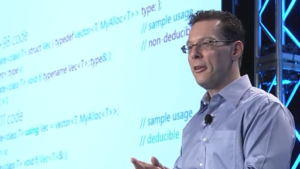CppCon 2016: Bringing Clang and C++ to GPUs: An Open-Source, CUDA-Compatible GPU C++ Compiler--Lebar
 Have you registered for CppCon 2017 in September? Don’t delay – Registration is open now.
Have you registered for CppCon 2017 in September? Don’t delay – Registration is open now.
While we wait for this year’s event, we’re featuring videos of some of the 100+ talks from CppCon 2016 for you to enjoy. Here is today’s feature:
Bringing Clang and C++ to GPUs: An Open-Source, CUDA-Compatible GPU C++ Compiler
by Justin Lebar
Summary of the talk:
GPU computing has gone mainstream. It is a dominant part of the performance landscape, providing the initial 10x performance lift to a wide variety of applications. However, programing for GPUs can be extremely challenging. C++ is rarely available in an unmodified form, and there are few portable and open source approaches available. One of the most popular platforms, CUDA, has no production quality open source implementation. As a consequence, its C++ support has lagged behind and it has been a less appealing area for researchers and others that weren’t comfortable relying on NVIDIA’s tooling.
However, today things are different. Clang is now a fully functional open-source GPU compiler. It provides a CUDA-compatible programming model and can compile most of the awesome CUDA libraries out there ranging from Thrust (the CUDA-enabled parallel algorithms library that gave rise to the new parallelism technical specification) to Eigen and TensorFlow.
In this talk we will give an overview of how LLVM and Clang support targeting C++ to GPUs, how they work to be compatible with existing CUDA code, and how you can build your code today to run on GPUs with this open source compiler.

 Have you registered for CppCon 2017 in September?
Have you registered for CppCon 2017 in September?  ACCU’s Overload journal of June 2017 is out. It contains the following C++ related articles.
ACCU’s Overload journal of June 2017 is out. It contains the following C++ related articles. CppCon 2017 just announced its keynote and plenary speakers:
CppCon 2017 just announced its keynote and plenary speakers:
 Herb is the convener (chair) of the ISO C++ standards committee.
Herb is the convener (chair) of the ISO C++ standards committee.
 Matt’s
Matt’s  Have you registered for CppCon 2017 in September?
Have you registered for CppCon 2017 in September? 